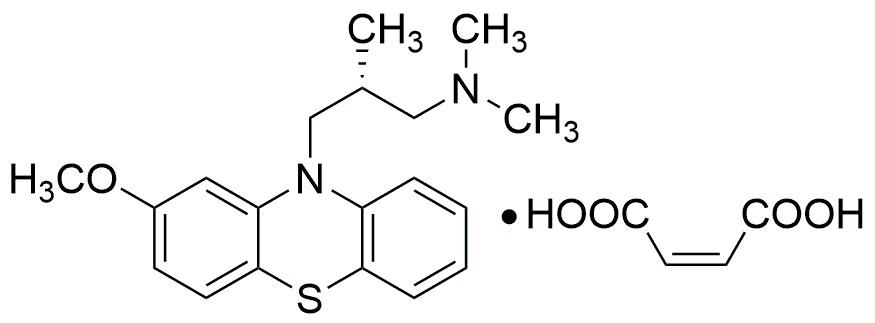Levomepromazine maleate is widely utilized in research focused on:
- Psychoactive Medication: This compound is primarily used as an antipsychotic medication, helping to manage symptoms of schizophrenia and severe anxiety disorders. Its effectiveness in treating these conditions makes it a valuable option in psychiatric care.
- Preoperative Sedation: In medical settings, it is often employed for preoperative sedation, providing patients with a calming effect before surgical procedures. This application is crucial for enhancing patient comfort and reducing anxiety.
- Pain Management: Levomepromazine maleate is also used in palliative care to alleviate pain and discomfort in terminally ill patients. Its dual action as an analgesic and sedative makes it particularly beneficial in hospice settings.
- Research in Neuropharmacology: Researchers study this compound to better understand its mechanisms of action on neurotransmitter systems, contributing to the development of new treatments for mental health disorders.
- Comparative Effectiveness Studies: It is often included in clinical trials comparing various antipsychotic medications, providing insights into its efficacy and safety profile compared to other treatments.
Informations générales
Propriétés
Sécurité et réglementation
Applications
Levomepromazine maleate is widely utilized in research focused on:
- Psychoactive Medication: This compound is primarily used as an antipsychotic medication, helping to manage symptoms of schizophrenia and severe anxiety disorders. Its effectiveness in treating these conditions makes it a valuable option in psychiatric care.
- Preoperative Sedation: In medical settings, it is often employed for preoperative sedation, providing patients with a calming effect before surgical procedures. This application is crucial for enhancing patient comfort and reducing anxiety.
- Pain Management: Levomepromazine maleate is also used in palliative care to alleviate pain and discomfort in terminally ill patients. Its dual action as an analgesic and sedative makes it particularly beneficial in hospice settings.
- Research in Neuropharmacology: Researchers study this compound to better understand its mechanisms of action on neurotransmitter systems, contributing to the development of new treatments for mental health disorders.
- Comparative Effectiveness Studies: It is often included in clinical trials comparing various antipsychotic medications, providing insights into its efficacy and safety profile compared to other treatments.
Documents
Fiches de données de sécurité (FDS)
La FDS fournit des informations de sécurité complètes sur la manipulation, le stockage et l’élimination du produit.
Spécifications du produit (PS)
Le PS fournit une description complète des propriétés du produit, notamment sa composition chimique, son état physique, sa pureté et les exigences de stockage. Il détaille également les plages de qualité acceptables et les applications prévues du produit.
Certificats d'analyse (COA)
Recherchez des certificats d'analyse (COA) en saisissant le numéro de lot du produit. Les numéros de lot et de lot se trouvent sur l'étiquette d'un produit, après les mots « Lot » ou « Lot de fabrication ».
Numéro de catalogue
Numéro de lot/série
Certificats d'origine (COO)
Ce certificat d'exploitation confirme le pays dans lequel le produit a été fabriqué, et détaille également les matériaux et composants utilisés et s'il est issu de sources naturelles, synthétiques ou autres sources spécifiques. Ce certificat peut être requis pour les douanes, le commerce et la conformité réglementaire.
Numéro de catalogue
Numéro de lot/série
Fiches de données de sécurité (FDS)
La FDS fournit des informations de sécurité complètes sur la manipulation, le stockage et l’élimination du produit.
DownloadSpécifications du produit (PS)
Le PS fournit une description complète des propriétés du produit, notamment sa composition chimique, son état physique, sa pureté et les exigences de stockage. Il détaille également les plages de qualité acceptables et les applications prévues du produit.
DownloadCertificats d'analyse (COA)
Recherchez des certificats d'analyse (COA) en saisissant le numéro de lot du produit. Les numéros de lot et de lot se trouvent sur l'étiquette d'un produit, après les mots « Lot » ou « Lot de fabrication ».
Numéro de catalogue
Numéro de lot/série
Certificats d'origine (COO)
Ce certificat d'exploitation confirme le pays dans lequel le produit a été fabriqué, et détaille également les matériaux et composants utilisés et s'il est issu de sources naturelles, synthétiques ou autres sources spécifiques. Ce certificat peut être requis pour les douanes, le commerce et la conformité réglementaire.

